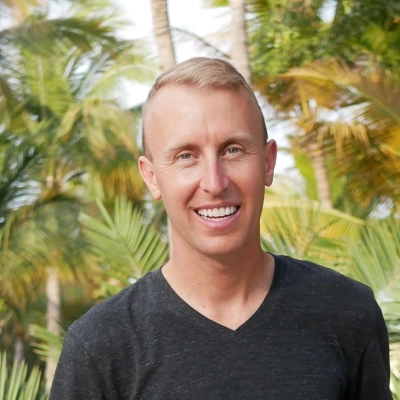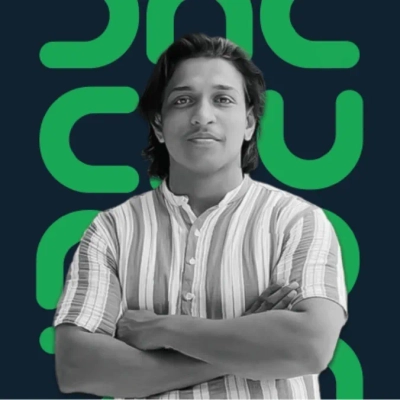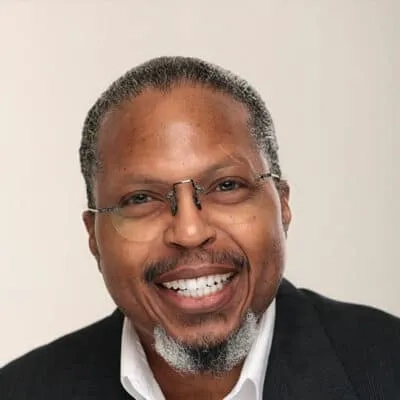9 Ways Cmos Prioritize Professional Development
In today's rapidly evolving marketing landscape, Chief Marketing Officers face unprecedented challenges in staying ahead of the curve. This article explores nine essential strategies for CMOs to prioritize their professional development, drawing on insights from industry experts. From leveraging social platforms for marketing insights to embracing continuous learning as a form of resilience, these approaches offer a roadmap for CMOs to enhance their skills and drive success in their organizations.
- Strategize Growth Like Brand Development
- Balance Technical Skills with Cultural Understanding
- Embrace Continuous Learning as Resilience
- Blend Formal Education with Community Engagement
- Treat Development as Operational Risk Mitigation
- Experiment Hands-On with New Marketing Tools
- Foster Adaptability Through Diverse Learning
- Leverage Social Platforms for Marketing Insights
- Apply 70-20-10 Approach to Skill Development
Strategize Growth Like Brand Development
As a CMO, I treat my own professional growth with the same level of strategy I apply to brand growth. Every week, I dedicate time to reading marketing case studies, product updates, and trend analyses from trusted sources like HubSpot, Semrush, and Think with Google. I make it a habit to analyze how emerging tools, consumer shifts, or platform algorithms impact campaign performance. Beyond that, I actively participate in marketing forums and communities where practitioners share insights from real-world experiments. These spaces keep me grounded in what's actually working in the field rather than just what's trending online.
I also believe that growth happens through conversation. I often exchange ideas with other marketing leaders and agency owners, discussing challenges, metrics, and creative approaches to scaling brands. Attending webinars and roundtable discussions helps me see how other industries solve similar problems differently. This mix of continuous learning, peer engagement, and applied experimentation ensures I stay adaptable and informed. In marketing, curiosity is a skill—and keeping it sharp is what makes leadership sustainable.

Balance Technical Skills with Cultural Understanding
As a CMO, I prioritize my professional development by remaining a constant student of both people and market dynamics. In our fast-changing marketing landscape, where tools, platforms, and consumer behaviors evolve rapidly, I've found focused, continuous learning to be essential. I carve out dedicated time for reading industry case studies, following thought leaders, and implementing new strategies with my teams, which turns theoretical concepts into practical knowledge.
One approach that's proven particularly valuable is building a strong network of peers and mentors who challenge my thinking. I often find that meaningful conversations teach me more than formal reports ever could. For marketing leaders, the sweet spot is balance: you need to sharpen technical marketing skills while simultaneously deepening your understanding of culture, psychology, and leadership fundamentals. These complementary skills are what ultimately make strategies effective in real-world applications.

Embrace Continuous Learning as Resilience
Learning, learning, learning. Honestly, that's the core of it. With everything evolving at the speed of light (technology, public interest, marketing trends), staying current isn't optional; it's the necessary resilience that keeps you in the game. I probably spend 20-25% of my time reading, researching, thinking, and adapting. That might sound like a lot, but in this landscape, if you're not carving out that time, you're already behind.
The world reshapes itself every day. Algorithms shift, buyer behavior changes, new platforms rise and fall before lunch. There are more than enough hungry entrepreneurs out there waiting for a chance to take your place. This isn't a lazy game. No one can pick up your slack when you stop learning; you either stay ahead of the curve or you disappear in the rearview.
For me, professional development isn't about collecting certificates or attending the latest webinar trend. It's about intentional curiosity. I study the people and businesses pushing the edges of marketing and tech, then translate those insights into playbooks we can use for real growth. I build time into my week to explore, test new tools, and question what's "working" now...because "working" is a moving target.
I also push my team to stay sharp. We share what we're learning, swap articles, debate ideas, and challenge each other to rethink the way we do things. That collaboration fuels the creative edge we need to provide our clients with that certain 'something' they're looking for to stand out in the crowd.
At the end of the day, being a CMO today means being part strategist, part student, part futurist. You have to learn fast, adapt faster, and build a culture where curiosity isn't a side quest; it's the main event.

Blend Formal Education with Community Engagement
Professional development is a continuous priority for me, and I make it a point to invest time in offline classes and expert sessions to expand my knowledge base. I also actively participate in various professional programs and communities where I can learn from peers while sharing insights from my own digital marketing experience. This balanced approach of formal learning and community engagement has been instrumental in keeping my skills sharp and my perspective fresh in this rapidly evolving marketing landscape.

Treat Development as Operational Risk Mitigation
Many aspiring CMOs believe that professional development means mastering a single channel, such as obtaining a certification. However, this is a significant mistake. A leader's role is not to excel in one function but to master the entire business.
I prioritize my personal growth by treating my development budget as an Operational Risk Mitigation Strategy. This approach has taught me to understand the language of operations. I no longer view development as optional education but as a non-negotiable operational cost.
To stay current, I take steps that involve cross-functional training. I move beyond the marketing silo and spend time learning the newest logistics software used by the Operations team, not just the latest marketing platforms. My goal is to reduce the knowledge gap that could lead to major operational failures. For example, understanding heavy-duty supply chain constraints allows me to market the 12-month warranty accurately.
The impact on my career has been profound. It transformed my approach from being a good marketing professional to someone capable of leading an entire business. I learned that even the best professional development is futile if the operations team cannot deliver on the promises made. The most effective way to be a leader is to understand every aspect of the business.
My advice is to stop viewing professional development as a separate entity. Instead, see it as part of a larger, more complex system. The most successful leaders are those who can speak the language of operations and comprehend the entire business. Such leaders are well-positioned for success.

Experiment Hands-On with New Marketing Tools
I dedicate Friday mornings to testing new AI marketing tools hands-on—not just reading about them. Last month, I spent three hours experimenting with AI-powered ad copy generators, which led us to implement a new service for clients. This "learn by doing" approach keeps me ahead of trends because I understand the practical limitations and opportunities, not just the hype. Real experimentation beats conference attendance every time.
Foster Adaptability Through Diverse Learning
Early in my career, I believed that growth as a marketing leader came from mastering every new tool or trend that emerged. However, over time, I realized that staying relevant as a CMO isn't about chasing trends—it's about understanding how people, technology, and communication continually evolve together. That shift in mindset completely changed how I approach my own professional development today.
As the founder of Nerdigital, I wear multiple hats, and one of the most important is staying curious. I set aside intentional "learning blocks" in my week, where I dive into something outside my comfort zone—whether it's an emerging AI marketing framework, consumer behavior study, or a leadership psychology podcast. I've found that some of my biggest breakthroughs didn't come from marketing conferences but from studying how people make decisions and connect emotionally with brands.
A few years ago, for example, I joined a mastermind group of founders and marketing leaders from completely different industries—from healthcare to fintech. Listening to their challenges and strategies expanded my perspective far more than reading another growth-hacking article ever could. It reminded me that good marketing isn't just about data or creative—it's about empathy, timing, and adaptability.
Another key practice for me has been surrounding myself with a team that challenges my thinking. I encourage open debate and reverse mentorship inside Nerdigital. Some of the best insights I've gained came from younger team members who see trends with a completely fresh lens. I think as leaders, our biggest risk isn't falling behind in skill—it's falling behind in perspective.
Finally, I treat professional development as an ongoing experiment. I allocate a personal R&D budget each quarter—sometimes it goes toward courses, other times toward testing new tools or methodologies in live projects. Even when these experiments fail, they often spark valuable insights about where the industry is headed next.
In the end, I see growth as less about accumulating knowledge and more about staying adaptable, humble, and hungry to learn. The moment you think you've mastered marketing, the market changes. So my goal isn't to stay ahead of the curve—it's to stay flexible enough to navigate it when it inevitably shifts again.

Leverage Social Platforms for Marketing Insights
I believe professional development is about maintaining curiosity and actively seeking out new knowledge. I regularly carve out time for podcasts and books that expose me to fresh perspectives and marketing approaches. Social platforms like Facebook have become valuable learning tools for me, as I've found their algorithms serve up interesting marketing ideas once I start searching for related content. There is always something new to learn in our rapidly evolving field if you're consistently looking for it.
Apply 70-20-10 Approach to Skill Development
I prioritize my professional development by treating it as a strategic business investment, not an optional activity. Every quarter, I dedicate time to assess emerging real estate marketing trends and identify specific skill gaps in my toolkit. Rather than trying to absorb everything, I follow a '70-20-10' approach: 70% hands-on application of new strategies in our campaigns, 20% learning from my network of professionals across industries (especially my previous connections in non-profit leadership), and 10% formal education through select courses. This balanced method ensures I'm not just collecting knowledge but actually implementing it to drive results for our homebuyers.




